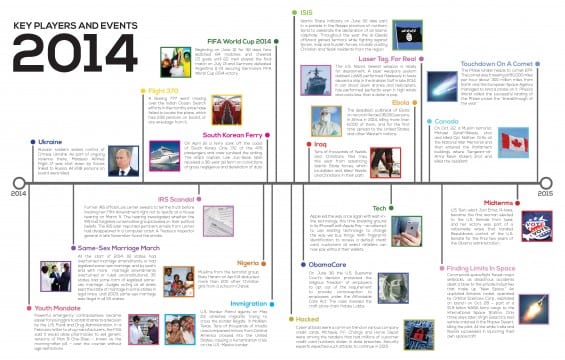Now 14 years into a new millennium, the year jerked us back to a past we thought we’d left behind: Beheadings, race riots, Soviet-style conflict, and runaway epidemics.

In the subterranean reaches of ancient churches in Mosul, Iraq — turned suddenly and in broad daylight to ISIS shrines — the captives of the 21st century met an abyss of medieval-minded militants and the unenlightened dawn of a new dark age.
The year turned on regifting. Like the stiff-necked aunt who keeps handing out fruitcake after all the relatives say, “Enough!” 2014 gave us ample taste of old and familiar history only wrapped in new paper.
With Ferguson, Mo., the streets of America demanded a new civil rights era, six years into the first African-American presidency and half a century since legal remedies took shape to end a long U.S. history of injustice to blacks.
Vladimir Putin took us back to Cold War days with an audacious takeover of Crimea and continued provocation in eastern Ukraine. Drawing a page from the agitprop era, he blamed his actions on “the enemies of yesteryear.”
Africa’s Ebola epidemic proved resilient to the world’s best public health protocols — affecting more than 25 countries on six continents and continuing unabated, with more than 18,000 cases and nearly 7,000 confirmed deaths by year’s end.
In the Middle East
A long-ignored ISIS rebranded itself as the Islamic State and served notice on the United States with the August beheading of journalist James Foley that war in Iraq was not over.
President Obama, who came into office pledging to end that war, found himself standing before the American people ordering airstrikes and then more military personnel to Iraq again. He pledged a “relentless effort” to help ensure that “those who offer only hate and destruction [are] vanquished from the Earth.”
Despite that pledge, ISIS by year’s end controlled nearly all the same territory it captured in 2014. With oil supplies and other revenue, it appeared poised to mount a bigger threat than al-Qaeda prior to 9/11.
Lost in the takeover: the destruction of Christian institutions in Syria and Iraq — a civilization stretching back to the first century. In Mosul the militants destroyed or converted to mosques 45 Christian churches or institutions, all now flying the black ISIS flag.
During a standing-room-only service in Rome that included Pope Francis, the Orthodox bishop of Damascus Jean Kawak recounted stories of starving, homeless Christians: “How much longer denied, we believers? We are not resigned to the darkness of evil. We are not people of resignation or despair. Christians are the people of faith and hope. … The anonymous prayer of many people has changed the course of history.”
At home
Domestically amid a growing world disorder came midterm elections securing Republican control of Congress, falling oil prices, and signs of economic recovery. Unemployment rates dropped but remain stubbornly high for 20- to 30-year-olds (in some places above 10 percent).
With a changing economy, plus changing values, the American family slid further into decline — under half as many new households (559,000) formed in the United States in the five years ending with 2014, compared to the five years before 2009 (1.2 million).
At the same time America’s “non-religious bloc” has nearly doubled to over 17 percent, prompting researchers to conclude, “The religious canvas of American life is being repainted before our eyes.”
From prison
In this sea of old and new, there is a gift we never tire of, and a Regifter who breaks through our retrograde tragedies moment by moment — One who knows our frame and remembers we are dust.
“The answer to the WHY is WHO,” wrote Iranian-American pastor Saeed Abedini from prison in a September letter on his daughter’s eighth birthday. “The confusion of ‘Why has all of this happened?’ and ‘Why your prayers are not answered yet’ is resolved with understanding Who is in control … Lord Jesus Christ, our God!”
Once again, but in a new millennium, we learn from a prison epistle the story of triumph despite a year’s suffering. “And so I want you to know that the answer to all of your prayers is that God is in control,” wrote Abedini, “and He knows better than us what He is doing in our lives and all around the world.”
World News Service

Comments